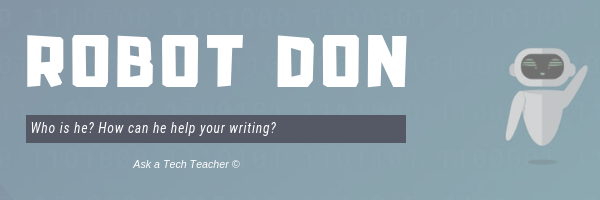Is using AI in your essay writing unethical and a potential reason your teacher may debate your work’s authenticity? Let’s find out the truth through the Ask a Tech Teacher team:
Ethics and the Use of AI in Essays
AI-driven tools and their use in creative writing, specifically with the purpose of writing essays, have long been a subject of heated debate. The argument against AI-powered tools remains the same: any content produced by artificial intelligence can be viewed as plagiarism. This is the same concern that has been posed about essay writing services and the people who use them. Reading a Scamfighter review is part of my routine, so it is easy to confirm that some writing services are indeed unethical and unprofessional if they use plagiarized content to complete your tasks. However, boundaries become murkier when it comes to AI and its role in writing essays.
Some teachers have an understandable fear of students completely neglecting the process of creating, shaping, and articulating their ideas when it comes to AI use. Why should they go through the process of refining their concepts and thesis statements when a chatbot can do the same ten times faster? Today, more and more tutors complain about young people not wanting to complete assignments on their own and using Unemployedprofessors discounts for essay writing help (check here if you want to get more information on how to get a promo code for your assignment).
Other students choose a more straightforward approach and bypass essay writing services in favor of AI-generated content. But can we blame someone for wanting to structure their essay properly and generate sentences that are grammatically correct? Let’s take a look at what makes using AI for your essay a serious misconduct.
When AI Writing Becomes Unethical
Major ethical concerns that arise when AI is utilized for writing are similar to the issues that students have to deal with when choosing essay writing assistance online. There are several key questions that bother students who are seeking help. Is Unemployedprofessors.com scam? Should I trust someone else with my homework? Apparently, you can run into the same kind of problems when you decide to rely on AI tools in your writing. Here are the challenges AI presents:
- A Risk of Plagiarism: Most AI tools are designed to use vast amounts of data and knowledge from multiple sources, so there is a big risk of you getting someone else’s work copied and presented as an original piece. Not only will it make your teacher mad, but you may also face legal consequences, as intellectual theft or copying someone else’s dissertation work or essay word for word is a serious offense.
- A Risk of Prejudice: AI tools can be deliberately programmed to offer a particular point of view, and who is to say that the information that it uses to help you create an essay is not biased? Some AI-generated essays may inadvertently spread harmful propaganda or myths about people’s race, gender, and nationality, which may lead to discrimination and stereotypical thinking.
- A Risk of Deception and Manipulation: If you constantly write essays with the help of an AI tool and never tell your readers that a human being does not produce your work, you might be accused of manipulating your reading audience. Unless your teacher explicitly states that you are allowed to use AI in your writing, you should always inform them about it in advance.
- A Risk of Misplaced Responsibility: Since AI is a machine, ethical boundaries are blurred when it comes to defining responsibility. Who should be held accountable for the inappropriate use of AI tools? We can’t put all the blame on artificial intelligence when the rules are violated, so this is a valid point of discussion when trying to write an essay with AI tools and unintentionally violating ethical boundaries while doing so.
Tips for Ethical AI Use in Writing
There is good news for people who would like to continue reaping the benefits of AI use in writing. We are going to illuminate the benefits for you in case you are planning to rely on AI tools to finish your next college task:
- Give AI a clear idea of what you want. Take time to create prompts that highlight the topic of your essay and customize these prompts as much as possible. This will give your text an original tone of voice and set it apart from other generic texts.
- Make sure you know the sources. After you have received prompts generated by AI tools to make your essay look more structured, ask for sources that were used in the process of obtaining the information. This is the best way to define the authenticity of a particular publication.
- Check your essay for plagiarism. Just because AI tools managed to produce immaculate text with no typos doesn’t mean it is entirely plagiarism-free. Using plagiarism checkers will ensure that you deal with 100% original content and can deliver your essay without the risk of being exposed.
- Read your essay before submitting it. AI tools can be quick to produce an essay of the highest quality, but you should always check the tone and style of your essay before you hand it in as part of your homework. Does it look like something you would write? Make sure the text is tailored to meet the teacher’s requirements and is similar to what you typically create for your writing class.
Here’s the sign-up link if the image above doesn’t work:
https://forms.aweber.com/form/07/1910174607.htm
“The content presented in this blog are the result of creative imagination and not intended for use, reproduction, or incorporation into any artificial intelligence training or machine learning systems without prior written consent from the author.”
Jacqui Murray has been teaching K-18 technology for 30 years. She is the editor/author of over a hundred tech ed resources including a K-12 technology curriculum, K-8 keyboard curriculum, K-8 Digital Citizenship curriculum. She is an adjunct professor in tech ed, Master Teacher, webmaster for four blogs, CSTA presentation reviewer, freelance journalist on tech ed topics, contributor to NEA Today, and author of the tech thrillers, To Hunt a Sub and Twenty-four Days. You can find her resources at Structured Learning.








































